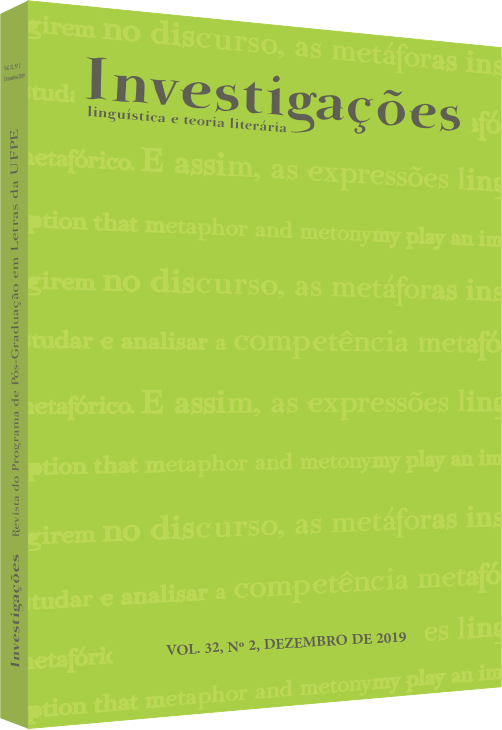“Fasten your seat belts”: Investigating learners’ perceptions regarding the implementation of tasks in an English online course
DOI:
https://doi.org/10.51359/2175-294x.2019.241326Abstract
Considering the growth of distance education, this qualitative study investigated learners’ perceptions of the implementation of traveling-themed tasks (ELLIS, 2003) in a virtual course of English as a foreign language. The course was offered to university staff members for a semester. Four participants took part in it. Instruments were a consent form, two questionnaires, and a Skype interview. Results suggest learners perceived the course as motivating, noticing their task engagement from the perspective of “l’education integrale” (LONG, 2015) and “learning by doing”. Furthermore, learning was related to cultural aspects noticed, interesting sites, and the connection with previous traveling experiences.
References
APPEL, C.; BORGES, F. Task design for L2 oral practice in audioblogs. The EUROCALL Review, 20.1, Proceedings of the Eurocall Conference 2011. University of Nottingham, 31st August – 3rd September, 2011.
BYGATE, M., SKEHAN, P.; SWAIN, M. Researching pedagogic tasks: Second language learning, teaching and testing. London: Longman, 2001.
COHEN, L., MANION, L.; MORRISON, K. Research methods in education. 5th ed. New York: Routledge, 2005.
CAPES. Universidade Aberta do Brasil. Disponível em: . Acesso em: 16 de Abril de 2018.
D’ELY, R. C. F.; TAVARES, M. G. G. Introduction: L2 learning/teaching and technology: a ‘CALL’ for a change? Ilha do Desterro, 66, Florianópolis, jan/jul, p. 009-018, 2014.
ELLIS, Rod. Task-based language learning and teaching. Oxford: Oxford University Press, 2003.
GOMES, Helton Simões. Pela 1ª vez, acesso à internet chega a 50% das casas no Brasil, diz pesquisa. Disponível em: <http://g1.globo.com/tecnologia/noticia/2015/09/pela-1-vez-acesso-internet-chega-50-das-casas-no-brasil-diz-pesquisa.html>. Acesso em: 16 de Abril de 2018.
GONZÁLEZ-LLORET, Marta. Designing task-based CALL to promote interaction: en busca de esmeraldas. Language Learning & Technology, 7.1, p. 86-104, 2003.
GONZÁLEZ-LLORET, M.; ORTEGA, L. Technology-mediated TBLT: Researching technology and tasks. John Benjamins, 2014.
LONG, Michael. Focus on Form in Task-Based Language Teaching. McGraw-Hill Companies: USA. p. 1-11, 1997.
———. Second Language Acquisition and Task-Based Language Teaching. Oxford: Wiley-Blackwell, 2015.
LYS, Francizka. The development of advanced learner oral proficiency using ipads. Language Learning & Technology, 17 (3), p. 94-116, 2013.
PAYNE, J. S.; WHITNEY, P. J. Developing second language oral proficiency through synchronous computer-mediated communication: output, working memory and interlanguage development. CALICO Journal, 20 (1), p. 07-32, 2002.
SALBEGO, N. N.; TUMOLO, C. H. S. Skype classes: Teachers’ and students’ perceptions on synchronous online classes in relation to face-to-face teaching and learning. International Journal of Language and Applied Linguistics, 1 (3), p. 36-45, 2015.
SILVA, M. Constructing the teaching process from inside out: how preservice teachers make sense of their perceptions of the teaching of the 4 skills. Unpublished Master Thesis. Universidade Federal de Santa Catarina, Florianópolis, 2004.
SKEHAN, Peter. A framework for the implementation of task-based instruction. In Branden, K. V. d.; Bygate, M.; Norris, J. (eds), Task-based language teaching: a reader (pp. 83-107). Amsterdam/Philadelphia: John Benjamins Publishing Company, 2009.
THOMAS, M.; REINDERS, H. (Eds.). Task-based language learning and teaching with technology. New York: Continuum Publisher, 2010.
TUMOLO, Celso. H. S. Ensino à distância: horizontes para o ensino de línguas estrangeiras. Fragmentos, 30, p. 25-34, 2006.
WANG, S.; VASQUEZ, C. Web 2.0 and second language learning : what does research tell us? CALICO Journal, 29 (3), p. 412-430, 2012.
YANGUAS, Inigo. Oral computer-mediated interaction between L2 learners: it’s about time! Language Learning & Technology, 14 (3), 72-93, 2010.
———. Task-based oral computer-mediated communication and L2 vocabulary acquisition. CALICO Journal, 29 (3), p. 507-531, 2012.
YUAN, Lin. A case study of non-English majors’ performance in Speak2Me virtual learning environment. Theory and Practice in Language Studies, 4 (2), p. 395-402, 2014.
Downloads
Published
How to Cite
Issue
Section
License
Copyright (c) 2019 Juliane Regina Trevisol, Leonardo da Silva, Raquel Carolina Ferraz D'Ely

This work is licensed under a Creative Commons Attribution 4.0 International License.
Authors who publish with Revista Investigações agree to the following terms:
Authors retain copyright and grant the journal right of first publication with the work simultaneously licensed under the Creative Commons Attribution 4.0 International (CC BY 4.0) license that allows others to share the work with an acknowledgement of the work's authorship and initial publication in this journal.
Authors are able to enter into separate, additional contractual arrangements for the non-exclusive distribution of the journal's published version of the work (e.g., post it to an institutional repository or publish it in a book), with an acknowledgement of its initial publication in this journal.
You are free to:
Share — copy and redistribute the material in any medium or format for any purpose, even commercially.
Adapt — remix, transform, and build upon the material for any purpose, even commercially.
The licensor cannot revoke these freedoms as long as you follow the license terms.
Under the following terms:
Attribution — You must give appropriate credit , provide a link to the license, and indicate if changes were made . You may do so in any reasonable manner, but not in any way that suggests the licensor endorses you or your use.
No additional restrictions — You may not apply legal terms or technological measures that legally restrict others from doing anything the license permits.

